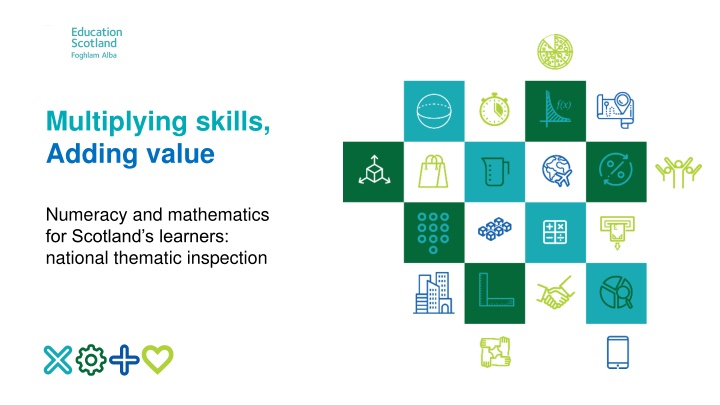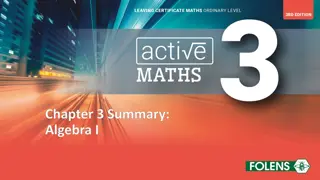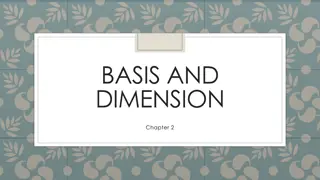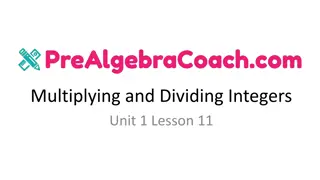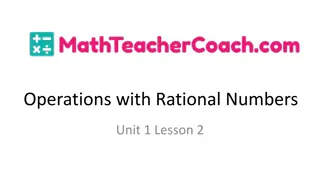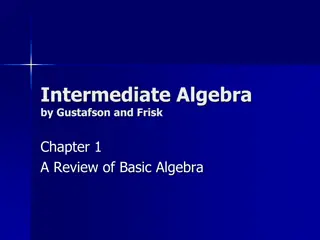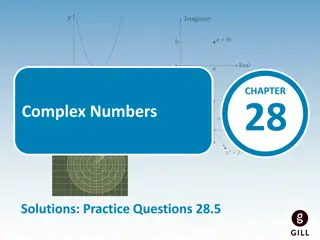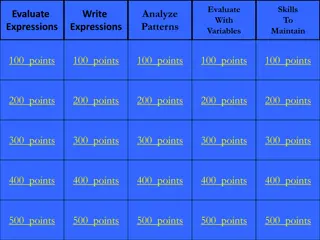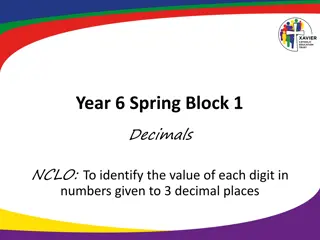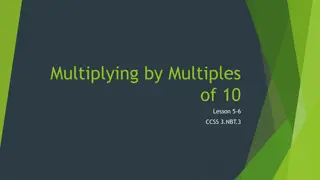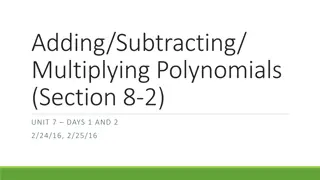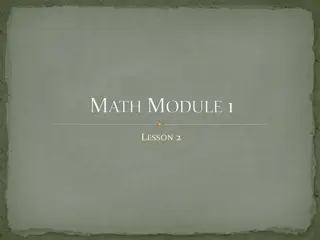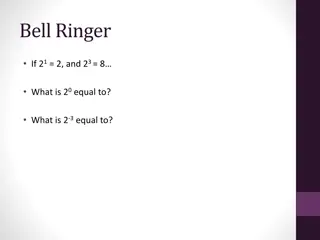Multiplying skills, Adding value
This content discusses the importance of improving numeracy and mathematical skills in Scotland's education system through national inspections, promoting improvement, and enhancing mathematical confidence for learners. It highlights the need for specialist mathematicians and a highly numerate population to meet the challenges of the 21st century.
Download Presentation

Please find below an Image/Link to download the presentation.
The content on the website is provided AS IS for your information and personal use only. It may not be sold, licensed, or shared on other websites without obtaining consent from the author.If you encounter any issues during the download, it is possible that the publisher has removed the file from their server.
You are allowed to download the files provided on this website for personal or commercial use, subject to the condition that they are used lawfully. All files are the property of their respective owners.
The content on the website is provided AS IS for your information and personal use only. It may not be sold, licensed, or shared on other websites without obtaining consent from the author.
E N D
Presentation Transcript
Multiplying skills, Adding value Numeracy and mathematics for Scotland s learners: national thematic inspection
Purpose of Scrutiny Scrutiny supports improvement and provides assurance on quality and improvement in Scottish education in order to promote the highest standards of learning leading to better outcomes for all learners. Providing assurance and public accountability; Promoting improvement; and Informing the development of education policy and practice. For Scotland's learners, with Scotland's educators Multiplying skills, adding value
National thematic inspections National thematic inspections are used to: promote improvement by identifying strengths which should be built on and identify key areas and challenges to be addressed; outline the features of high quality provision which are having a positive impact on children and young people and should be achievable by all; and provide assurance on what is working well and what needs to improve. For Scotland's learners, with Scotland's educators Multiplying skills, adding value
Multiplying Skills, Adding Value To face the challenges of the 21st Century, each young person needs to have confidence in using mathematical skills, and Scotland needs both specialist mathematicians and a highly numerate population. Building the Curriculum 1 For Scotland's learners, with Scotland's educators Multiplying skills, adding value
Multiplying Skills, Adding Value Making Maths Count (2016) set out three important objectives. transforming public attitudes improving confidence and fluency in maths; and promoting the value of maths for every career For Scotland's learners, with Scotland's educators Multiplying skills, adding value
Recommendation 5 of MMC (2016) Education Scotland should evaluate the quality of children s and young people s learning experiences and attainment in maths and share examples of practice. P17 Final report of the making maths count group, 2016 For Scotland's learners, with Scotland's educators Multiplying skills, adding value
Multiplying Skills, Adding Value The report hopes to speak, clearly, to every stakeholder with an interest in mathematics, helping to identify their roles your roles in this important national work. Numeracy and mathematics are important to us all. Gayle Gorman - HM Chief Inspector of Education Published (December 2019) Executive summary Full report Comments and Cameos For Scotland's learners, with Scotland's educators Multiplying skills, adding value
Multiplying Skills, Adding Value Evidence gathered from fieldwork and wider scrutiny activities 40 centres and schools, across the 32 local authorities visited January 2019 to June 2019 Discussions with headteachers, curriculum leads, class teachers, children and young people and other stakeholders Observations of learning Wider HMI evidence from scrutiny activities including school inspection programme For Scotland's learners, with Scotland's educators Multiplying skills, adding value
Multiplying Skills, Adding Value We hope and intend that this report: builds on the recommendations of Making Maths Count (MMC) takes forward the MMC idea of a maths-positive nation celebrates success where that is due, providing direction where work remains to be done adds momentum to improvements in Scotland s early learning and childcare settings and schools. For Scotland's learners, with Scotland's educators Multiplying skills, adding value
Numeracy and mathematics - Findings What is working consistently well? What is improving? What are the challenges and areas for improvement? Questions, comments and cameos For Scotland's learners, with Scotland's educators Multiplying skills, adding value
Curriculum What is working consistently well? The commitment of staff to improve the curriculum in numeracy and mathematics, building on proven strengths and tackling key areas for improvement. Staff s investment in career-long professional learning in aspects of numeracy and mathematics. The clarity which settings and schools have achieved in shared understanding of the key features of national, local and establishment policies, for numeracy and mathematics, which seek to improve outcomes for all children and young people. For Scotland's learners, with Scotland's educators Multiplying skills, adding value
Curriculum What is improving? The focus on closing the poverty-related attainment gap, including reference to numeracy and mathematics issues. The impact of self-evaluation which is increasingly evident in strategic planning for numeracy and mathematics. The professional learning focus on pedagogy, across all sectors. Evidence of successful focus on strengthening skills in number. For Scotland's learners, with Scotland's educators Multiplying skills, adding value
Curriculum What are the challenge and areas for improvement? Leadership for learning has not yet achieved sufficiently high standards and consistency in learners experiences in numeracy and mathematics within and across sectors. The curriculum needs constant review to ensure it is relevant, for example capturing real-world numeracy and mathematics context, leading to increased motivation and appropriate progression in children s and young people s learning. For Scotland's learners, with Scotland's educators Multiplying skills, adding value
Curriculum What are the challenge and areas for improvement? Professional learning, whilst deepening staff knowledge and skills in numeracy and mathematics, is not yet resulting in significant improvements in outcomes for children and young people. The corporate expertise in the education community, for gathering and analysing data on attainment in numeracy and mathematics, needs to be further enhanced. For Scotland's learners, with Scotland's educators Multiplying skills, adding value
Curriculum What are the challenge and areas for improvement? The balance of the curriculum needs to be kept under review, to ensure proportionate coverage of shape, position and movement, and information handling, and to avoid an over-emphasis on aspects of number. For Scotland's learners, with Scotland's educators Multiplying skills, adding value
Comments and Cameos Case study A: A secondary school has worked with a range of stakeholders to develop an aspirational vision for both its numeracy and mathematics curriculum. Of particular note are the school s approaches to numeracy across learning. Key features include: Consistent approaches to numeracy across all curricular areas with a common methodology and language Regular work to build capacity across the school and primary cluster The school has recognised the importance of numeracy and mathematics in the school improvement plan This has resulted in all staff taking ownership of numeracy as a responsibility for all, and numeracy and mathematics having a positive, high profile within the school and wider school community. For Scotland's learners, with Scotland's educators Multiplying skills, adding value
Reflective Questions Senior leaders and middle leaders in early learning and childcare settings and schools: Where are the strengths in our curriculum, learning and teaching and attainment in numeracy and mathematics? How clearly do we know our priorities for improvement and how convincing are our plans and strategies? Where do numeracy and mathematics feature in our improvement planning? How well do we use the four curriculum contexts, real-world topics and wider contexts and contributions to add value and credibility to our programmes in numeracy and mathematics? Among our professional learning targets, do we need to do anything to improve our capacity for generating and analysing attainment data? For Scotland's learners, with Scotland's educators Multiplying skills, adding value
Learning and teaching What is working consistently well? Positive relationships among and between learners and staff, laying foundations for a positive tone to learning. Clear commitment to closing the gap in attainment between children from the most- and least-disadvantaged areas. Most learners positive views about learning in numeracy and mathematics. Most respond well to strategic approaches, for example the concrete/ pictorial/ abstract structure. Teaching is well organised and almost all staff offer clear explanations. For Scotland's learners, with Scotland's educators Multiplying skills, adding value
Learning and teaching What is improving? The quality of dialogue among associated schools, and transition arrangements, which support children and young people to build on their prior learning in numeracy and mathematics. The recognition that using real-world numeracy and mathematics contexts can achieve huge impact on learners motivation. A focus on professional learning in aspects such as moderation, and questioning techniques which encourage higher order thinking skills. For Scotland's learners, with Scotland's educators Multiplying skills, adding value
Learning and teaching What are the challenges and areas for improvement? Invest further in pursuing greater consistency in the quality of learning and teaching, eliminating passive learning, specific to the complementary needs of numeracy and mathematics. Continue to focus on planning, tracking and monitoring, to inform how well children and young people progress through the broad general education. Revisit issues of differentiation, to advance practice in meeting the needs of all learners for pace and challenge appropriate to their individual needs. For Scotland's learners, with Scotland's educators Multiplying skills, adding value
Attainment and achievement What is working consistently well? In almost all early learning and childcare settings, practitioners make effective use of the routines of the day, for example reception and registration, and snack time, to build interest and progress in learning relevant to numeracy. These approaches capitalise on the role of numeracy in the children s everyday lives. Almost all staff in primary schools show commitment to raising attainment and achievement in numeracy and mathematics. Almost all staff have invested in professional learning focused on attainment strategies including approaches for developing early arithmetical skills. For Scotland's learners, with Scotland's educators Multiplying skills, adding value
Attainment and achievement What is working consistently well? National data shows that across the senior phase, the majority of young people presented perform well in numeracy and mathematics at relevant SCQF levels, including at National, Higher and Advanced Higher. In 2019, attainment in mathematics improved slightly at National 5 with the majority of young people presented achieving an award at A-C. The number of young people taking Applications of Mathematics (formerly Lifeskills Mathematics) increased substantially from 2018 to 2019, with a majority achieving National 5. For Scotland's learners, with Scotland's educators Multiplying skills, adding value
Comments and Cameos Case study B: In this special school, learning takes in place in an interdisciplinary manner. Lessons are planned to ensure children experience all curricular areas with a sensory context appropriate to their needs. This holistic view of learning challenges teachers to be able to identify the early mathematical concepts within a range of activities. Children and young people are supported to transfer their skills in different curricular areas. Mathematics and numeracy are developed actively in real life contexts. Enterprise and citizenship activities support children and young people to experience learning in a range of contexts. Opportunities to practise numeracy and mathematics skills in new environments with unfamiliar people are increasing year on year. These include opportunities to visit an outdoor adventure centre, a community classroom, a local college and a skills academy. For Scotland's learners, with Scotland's educators Multiplying skills, adding value
Reflective Questions Early learning and childcare practitioners and class teachers: What response do I see from children and young people when we are working on numeracy and mathematics? What impact do my approaches and pedagogy have on them, in terms of outcomes progression and achievements? Do I have a clear understanding of current thinking on high-quality learning and teaching in numeracy and mathematics, relevant to the children and young people I work with? Do my opportunities for professional learning give me confidence that my practices are effective and improving? For Scotland's learners, with Scotland's educators Multiplying skills, adding value
Reflective Questions Support staff: What role do I have/should I have, in supporting children and young people in their work in numeracy and mathematics? Do my opportunities for professional learning give me confidence that my contributions are effective? Am I fully equipped with knowledge of the setting s/school s approaches in numeracy and mathematics, and supported in fulfilling my role? For Scotland's learners, with Scotland's educators Multiplying skills, adding value
Attainment and achievement What is improving? Early learning and childcare practitioners are increasingly using play-based pedagogy approaches to advance children s learning in numeracy. Most make effective use of different play settings to capture children s interest, for example in ideas about number and money, shape and movement. The majority of primary schools have included a focus on numeracy and mathematics in their plans for Pupil Equity Fund. Almost all have undertaken reviews of programmes with the aim of improving attainment, for example adopting more rigorous approaches to mental strategies. For Scotland's learners, with Scotland's educators Multiplying skills, adding value
Attainment and achievement What is improving? Collaborative working in numeracy and mathematics across school groups is supporting better teaching and more reliable judgement of achievement of a Curriculum for Excellence level. The increasing reliability of assessment data. Teachers make better use of information from ongoing assessment, Scottish National Standardised Assessments and National Benchmarks to inform their professional judgement. For Scotland's learners, with Scotland's educators Multiplying skills, adding value
Attainment and achievement What is improving? National data shows that the majority of S4-S6 leavers achieve an SCQF level 5 numeracy award or better, with the proportion increasing in recent years. The percentage of young people (a majority) passing Higher mathematics at A to C increased from 2015 to 2018 but fell slightly in 2019. For Scotland's learners, with Scotland's educators Multiplying skills, adding value
Attainment and achievement What are the challenges and areas for improvement? There remains scope for early learning and childcare practitioners to explore further the role of play settings as contexts for learning in numeracy, for example through professional dialogue and professional learning. Overall, primary schools should explore further the potential of STEM and DYW to add value to children s experiences in numeracy and mathematics, alongside more local contexts including the school s own provision for IDL. For Scotland's learners, with Scotland's educators Multiplying skills, adding value
Attainment and achievement What are the challenges and areas for improvement? In a minority of schools, progression routes in the broad general education are not providing learning which allows young people to make a smooth transition to the senior phase. This is resulting in challenges meeting the requirements for succeeding at National 5 by the end of S4. There remains a gap in performance between children and young people from the least and most deprived areas, especially at fourth level of Curriculum for Excellence. For Scotland's learners, with Scotland's educators Multiplying skills, adding value
Comments and Cameos Case Study C: There has been a focus in one primary school on ensuring children s wellbeing needs are being met and that they are in a positive frame of mind to learn. They have increased attendance at school. Over several years, staff have been working on ensuring children have a positive attitude to numeracy and mathematics and see the relevance in their own lives and in the jobs around them in their local area. Alongside this has been a clear focus on improving the approach to learning and teaching in numeracy and mathematics. Children are now much more actively engaged in their learning in mathematics and they have been successful in improving children s attitude to numeracy and mathematics. As a result children s attainment overall has improved. For Scotland's learners, with Scotland's educators Multiplying skills, adding value
Reflective Questions Local Authorities: How well do our processes for supporting and challenging our establishments meet the needs of our children in numeracy and mathematics? Do our authority and regional collaborative improvement plans give sufficiently clear priority to numeracy and mathematics? In respect of professional learning, how effective are our arrangements for staff to network, to share good practice in numeracy and mathematics? For Scotland's learners, with Scotland's educators Multiplying skills, adding value
Education Scotland Denholm House Almondvale Business Park Almondvale Way Livingston EH54 6GA T +44 (0)131 244 5000 E enquiries@educationscotland.gov.scot For Scotland's learners, with Scotland's educators For Scotland's learners, with Scotland's educators Multiplying skills, adding value
